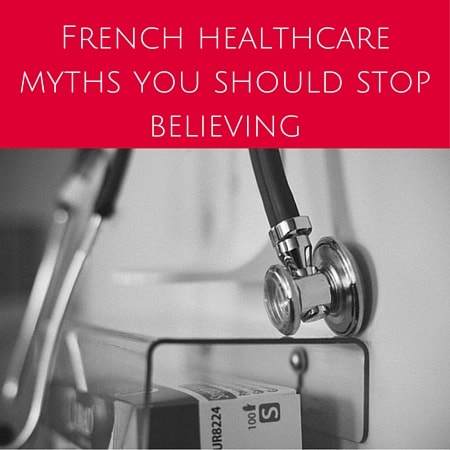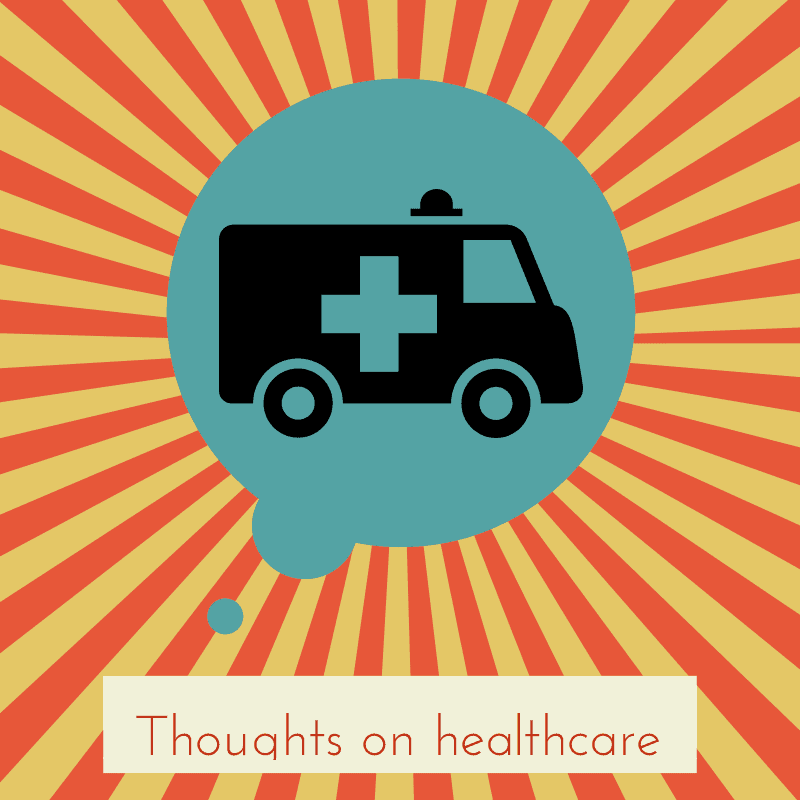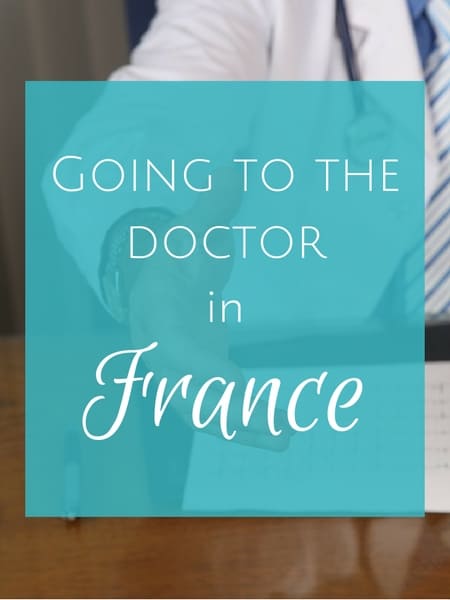After almost 4 years of living in France and experiencing French healthcare first-hand — as well as seeing the experiences of those around me — I’ve concluded that many aspects of the country’s medical system here are superior to healthcare in the US. But there are of course France healthcare system pros and cons we need to unpack too. In my experience with the French healthcare system, doctors have been patient, kind and thorough overall. Quality of care is subjective and largely depends on the doctor, like anywhere — I’ve experienced both sides of the coin. I’ve had great and not-so-great care in the USA and in France, but overall I’m extremely happy with the French healthcare system, but that’s not to say it’s perfect. Let’s look at the French healthcare system pros and cons.
Let’s look at some French healthcare system pros and cons and the myths people believe about how healthcare is done in France.
France healthcare system pros and cons
Let me kick this off by saying my thoughts here on the French medical system are based on my own personal experiences. I don’t claim to know everything (far from it!). The myths I talk about below have come directly from readers and other people I’ve come into contact with over the years.
Also, healthcare is a complicated and emotional topic so please keep your comments respectful if you choose to leave one below. You can read more about how healthcare works in France here (in French).
First, to give you some background, the French medical system is a universal service comprised of a network of public and private hospitals, doctors and other medical service providers. When you go to the doctor in France, payment is expected at the point of service and people in need of healthcare are not turned away due to age, employment status or pre-existing conditions.
Also, another post you might find useful is this one on common American medications and their French equivalents.
OK, onward and forward…
Myths about the French healthcare system:
Myth: That everyone gets coverage.
Only French citizens and legal French residents are covered by the French healthcare system and will be reimbursed — basically those who are paying into the system. If you’re visiting France as a tourist from the USA and break your leg, you will absolutely be treated, no questions asked, but you’ll be responsible for all costs.
In many cases, your American insurer will cover the cost but sometimes they won’t. Granted, the costs are much less than you’d pay in the US but they’re still your responsibility and are often more than what you’d pay as a French resident who is being partially reimbursed.
One fantastic thing I want to point out is that if you lose your job, you don’t lose your health insurance in France. Many times in the USA, if you lose your job, you lose your (and your family’s) health insurance along with your paycheck or are forced to pay for COBRA. The French system is independent of one’s employment status — and doesn’t discriminate based on age, wealth, or your social class.
Even if you become unemployed, you don’t have to worry about bankrupting your family if you need surgery or another costly medical procedure.
For anyone who gets anxiety thinking about healthcare or has ever struggled with coverage, the fact that your job doesn’t factor in to you and your family’s health plan is a major plus.
From a human rights perspective, this is the way to go.
“Access to health care appears to have produced a healthier nation,” writes the WSJ. “France’s infant death rate is 3.9 per 1,000 live births, compared with seven per 1,000 in the U.S. The country has more hospital beds and doctors per capita than the U.S., and a markedly lower rate of mortality from respiratory disease. And France spends less (10.7% of gross domestic product) on health care than the U.S. (16% of GDP).” France’s system is not without fault though.
A visit to the French dentist… things you never want to hear your dentist say >>
Myth: That French healthcare is free (or really cheap).
This one is probably the biggest misconception about French healthcare — that it’s free. I just heard it last week from a healthcare professional in the USA and it’s just not true! Compared to the cost of care in the USA, French healthcare costs are without a doubt more affordable. But free? No.
Let’s not forget that the French, and those of us who are permanent residents, pay heavy social charges (plus income tax, real estate tax, TV tax, etc. that further diminish take home pay). We all pay into the system, along with employers on the back end.
Even though the flat fee of 23 euros is cheap for a general doctor’s visit (and most of that is reimbursed by the social security system, and even more if you pay for supplementary insurance), the French do pay a hefty sum for their healthcare beyond that but it’s not when services are rendered. Every paycheck you get shows the deductions for social charges (including healthcare) and you pay into the system whether you’re sick or not.
Beyond paying into the system, French health services are not always low cost. Dental costs are especially high. If you don’t have a good supplementary insurance plan, procedures like root canals and getting a crown can be quite costly.
Many seemingly regular medicines, tests, and services are NOT covered and have to be paid out of pocket. An example of this is psychologists’ visits.
To give you some context, a French family member had a colonoscopy recently and the procedure itself was covered but the anesthesia was not. Most people opt for anesthesia so the procedure is more comfortable and end up paying out of pocket. The fee isn’t exorbitant, but my point is that it’s not free.
Some of these charges are reimbursed by the patient’s mutuelle (supplementary insurance most French people pay for to pick up the difference between what’s reimbursed and the full cost of the service). All birth control pills are not covered and you pay the cost of any medication not covered (cheaper than the US though) out of pocket. Same with any specialized blood testing for allergies, etc.
Here’s another example. A family member’s gluten sensitivity blood test wasn’t covered — 90 euros out of pocket, 0 reimbursed. If you’re dying of cancer, you’ll be taken care of but for conditions that require a little more digging, it’s not always a given that you’ll get rapid, in-depth care at a super affordable price, especially in rural areas where specialists might not be as readily available.
If you have a chronic, non-life threatening illness or something that requires specialists who order out-of-the-ordinary tests, or alternative providers in general, you often have to really advocate for yourself and be aware that certain tests won’t be reimbursed. That said, medical bankruptcies don’t exist in France so even if you are paying out of pocket, you won’t lose your house.
Something else that I’ve learned is that mental health costs, aside from psychiatrists, are not reimbursed by the French healthcare system as mentioned above. If you don’t need the care of a psychiatrist but would like to see a psychologist, you absolutely can, but they are paid out of pocket. Some mutuelles will cover a certain number of sessions per year.
Going to the doctor in France… what you need to know >>
Myth: That the French healthcare system is great across the board and every doctor and practitioner is amazing.
“Great” is subjective and wholly depends on the facility, doctor, their mood, their stress level, etc. Of course not every person is going to have a great experience every time. That doesn’t exist anywhere in the world. There are great and not-so-great practitioners everywhere in the world. Let’s not fall for the grass is always greener syndrome.
What does “great” mean to you? I may be biased but I firmly believe that French healthcare is great for emergency and routine coverage. If you need emergency surgery, are pregnant, or have aggressive cancer, the French system has you covered.
Along with that, if you’re reasonably healthy and see the doctor once a year and rarely need specialists, the French system is great as well. But if you need to see specialists regularly, they can be difficult to book an appointment with due to overcrowding.
In my area, there was a shortage of dentists and dermatologists when I first moved due to many of them retiring around the same time. There was a 6-month wait for new patients. I still haven’t managed to find a local GP because no one is accepting new patients.
To be fair, this is often the case in the US too. My dermatologist in New Jersey was impossible to get an appointment with and when you did get in, she spent a rushed 5 minutes with you. And billed the insurance obscene amounts. Does this happen in France? Sure (not the obscene amounts part though). Doctors are busy but sometimes it depends on the day. I have to say that I’ve also spent 45 minutes with my doctor who was patient and thorough.
I’ve also run into many doctors with terrible bedside manner and it seems to be quite common.
Myth: That it’s easy to see specialists.
French doctors are well-trained and competent, so there’s no question about their education or ability. You can access all types of specialists. Keep in mind that if you call a specialist on your own without a referral from your GP, it often means you’ll be paying for the full consultation cost, so see your GP first for that referral whenever possible.
Also, unlike general practitioners, specialists are allowed to set their own rates beyond the standard rate and only a portion of whatever the government deems a reasonable charge is reimbursed (non-conventionné). So if the regular cost to see a dermatologist is 45 euros but yours charges 70 euros because he’s in demand and can legally charge more, you’re only reimbursed a portion of that baseline charge of the official 45, not the entire 70.
As noted above, it’s sometimes very difficult to get in to see a specialist if you’re new to an area and/or your condition is urgent but not dire. Even if you aren’t new to an area but you’re a new patient, you’ll sometimes have to wait. Tom had to see a specialist and the wait was 3 months and then she ordered an MRI, which he had to wait another two months for. The day of the scan, the secretary called to say the machine was broken and it took another month and a half for them to reschedule him.
Does this happen for everyone and every doctor? No. But it’s not unheard of either.
Another example is that I needed a new gynecologist because mine retired. Not a single female doctor in a 30-minute radius was accepting new patients, so I now see a midwife instead for routine exams and prescription refills.
Lesson here if you really can’t wait? Be persistent and politely insist that you need an appointment sooner rather than later. It’s best to learn how to finesse people over the phone in French. Also, I’ve learned that giving details to the secretary can work in your favor. Sometimes when the gatekeepers pity you, they’ll be more likely to help — that goes double if you’re being polite. 😉 But more often than not, you just have to wait.
***
There are pros and cons to everything in life and the French healthcare system is no exception. Overall, I prefer the French system over the American one. It has a lot going for it. But as I said, it’s far from perfect.
The next time you hear someone talking about French healthcare, perk your ears up and see if they know fact from fiction! What are French healthcare system pros and cons for you?
How’s your experience been with French healthcare? What pros and cons of France’s healthcare system have you observed?
PIN IT:








I feel like I could write a novel here, but tl;dr I LOVE the French healthcare system! Maybe it’s because I’m in Paris, but I haven’t had a problem booking dermatologists (it depends on which one) or eye doctors. I used doctolib.fr and got an eye doctor appointment the next day when I self-diagnosed a scratched cornea (it was conjunctivitis) and same with a gynecologist my friend recommended. I need to get two crowns replaced and the estimate is 2000€ but after reimbursement my cost will be 200€ because I have a mutuelle.
Awesome, so glad you’ve had a good experience too! It’s nice to not have to worry how much my doctor’s visit will cost or how much special tests will cost. Such a relief!
I agree with these myths! Though luckily, as we’re in a big city and not a “desert medical”, we never have huge wait times.
However, if you’re paying for your birth control, you may want to talk to your doctor about switching. I never pay for mine. It’s completely covered. Even when I didn’t have a mutuelle, I only paid that part (about a euro). Unless you’re super sensitive and need to be on a specific type, there are options that are covered.
Interesting, thanks Shannon. I will look into that. I was under the impression (both from my pharmacist and doctor) that the pill was NOT reimbursed at all, ever. Maybe they are misinformed? In any case, will get to that bottom of that. Thank you!
It’s depend on the brand of your pill. Some pills are reimbursed, some not (I don’t know how they choose…).
It’s funny I just post on my blog my last visit to a physician in the US and how we feel when we received our first bill.
Do you mind saying how much the anesthesia for your family member’s colonoscopy cost? I’ll need that in a few years and it will be good to know for comparison. Last year in the US my health insurance company initially refused to pay the 1000 dollar bill for anesthesia but eventually covered the total cost. Thanks!
Hi Bob, the cost of anesthesia is nowhere near what it is in the USA. I don’t know if it’s an apples to apples comparison (not sure of the exact drugs involved but I believe it was twilight sedation for the colonoscopy) but I know the family member paid 40 euros outside of the regular fees. It was a special fee for the anesthesiologist but I think his mutuelle picked up the rest of the cost. You have nothing to worry about w/routine procedures like that in France 😉
If it is of any interest to you I have just had a colonoscopy in Angouleme and I decided not to have an anaesthetic. It was no problem and I could watch the screen as to what was happening. I did start having a few cramps after a while and the surgeon just gave me an injection to relax the muscles. I would never go with anaesthetic if I had to have it done again.
As a french living in the US, it is very interesting to read from the opposite point of view. I agree with your article, but I did not test the american medical care yet, so I cannot compare it.
Hello, in the USA as long as you are employed (or your partner is) by a company that provides great health coverage and you don’t lose your job, you’re fine most of the time. That said, I know people who have “great” USA insurance but still have a large copay (out of pocket cost) for hospital visits. A friend in the US had surgery and his procedure was $40,000 and his portion out of pocket was still several thousand dollars. A friend had pregnancy complications, a c-section and the baby stayed in the NICU. All that was billed to the insurance at over $100,00, with out of pocket costs still around $8000, all with insurance. It’s hard to speak generally about the US system because there are so many different plans and coverage %. Without insurance though, it’s very, very hard to pay for care especially if you have an illness that requires frequent medical visits and medication. Thank you for checking out the post!
Didn’t the ACA (aka Obamacare) work out for you, Diane? I’ve heard great things about it from a (progressively political website called The People’s View (now called Reclaim The Fight), and about how it’s just as good as European and other similar national systems.
BTW, Reclaim The Fight did do an article about health care in America and other countries that makes for interesting reading.
I miss the French system. When I was in France I never worried about the cost to have me and my family taken care of in case of big trouble. Over here in the US, I feel sometimes that it’s like going to the garage repair. They need to make money and sometimes you might be advised for something you don’t need. Also, they need to make money to pay their insurance. Over here, you are advised to shop for your health. Health is still the priority but the cost is a big factor in decision making. If you want to be prepared to worst case scenario in the US, it costs a lot in fact. People can fell in poverty because of a life accident. Now in France, because the cost is almost hidden, the problem is that the system is in debt. Health should not be a business like any other to my mind so French system is closer to the ideal system for me.
Thank you I often wonder about health care in other countries as what you hear isn’t always the way it is.
I strongly support tax-funded healthcare systems like in France or in Canada. I can’t imagine having to deal with private insurances like in the US. It’s just… yeah, I can’t find a single good thing about it. Sorry. Not anti-American, BTW, it’s a country I like a lot and there are many good things there… but I don’t think the healthcare system is one of them.
That said, the French and the Canadian systems aren’t perfect either. I love the fact that we don’t have to pre-pay in Canada (you just show your healthcare, either it’s covered, either it isn’t). However, you are often rushed as a patient and getting a referral for a specialist can be very difficult.
To support your first point, I am no longer covered in France, even as a French national, because I no longer live there.
This seems to me to be a balanced view of French healthcare. From a British perspective I find access to specialists very easy (the fact that you can see one even if there’s a wait to me is great! In UK you have to be referred and many GPs won’t until you’re on death’s door!) From a personal point of view all of my experiences have been good (2 pregnancies especially). But of course nowhere is perfect and there are certainly some less than “sympa” doctors out there. Thanks for linking up tooo #AllAboutFrance
Very interesting post! Really good to hear the myths deconstructed. Every country has slightly different healthcare systems and there are undoubtedly pros and cons for all. #allaboutfrance
Great piece, Diane! I had positive (albeit sometimes awkward) experiences with health care in France. I’d say my biggest problem was that my carte vitale never arrived after 3 years of continually reprocessing and resubmitting my documents! I got my card in Germany in 3 weeks! Just a severe run of disorganization and bad luck! 🙂
When you first come to live in France the health care system seems so complex but I guess that’s the same with everything when you move to a new country & system. The system does still fox me a bit, sometimes you pay up front and it gets reimbursed, other times you don’t pay a penny! The treatment I have had has been exceptional, since moving here I’ve had cataract operations on both eyes, and another op earlier this year – I give the French system & level of care a big thumbs up – especially when compared against the UK!
Quite agree that it’s certainly superior to the UK in terms of quality of care. The only thing that annoys me is the vast quantities of medicine that seem to accumulate in our cupboard no matter how much we try to restrict them. Expensive, wasteful and unnecessary.
I have to say that we have made good use of the French medical system since we have moved over here (heart problem, fractured spine, broken arm, grommets, preventative health screening, badly cut arm etc) and whilst we have had to pay our for some parts the service overall has been excellent. We waited 18 months even to see an ENT specialist for grommets in England yet here within 3 weeks our second son had had his operation. But I do agree with Curtis over the amount of medicines and dressings you end up buying! #AllaboutFrance
Hi,
I consider myself very lucky to live in France. You see, I’ve been tetraplegic for 13 years now and I’ve never had to pay for healthcare, physiotherapie or even personal assistance. Even when I need furniture (like a wheelchair or anything else), it’s taken in charge. I even had a pansion before I found a job.
How is it in the US?
Sorry for the mistakes
Hi Diane,
That was a totally helpful article – thank you so much!
My recent experience is France was quite disturbing. Btw I am America. I was on vacation in France staying at the Disney resort outside Paris. I thought I might possibly have a PE. (blood clot in the lung) Paramedics were called and I was taken to the hospital. First sign it wasnt going to go well- they had me walk to the ambulance. You don’t do this with a possible PE. The ambulance was bare bones. Upon arriving they had me walk into the waiting room. Apparently there were no wheel chairs- in the whole hospital. I was processed within 20 minutes. Not ideal. They didn’t take a medical history. Finally I was sent to a gurney and told not to get off it. I waited a half hour before I was taken into the room. Another 10 minutes and a nurse came in and checked vitals, drew blood and set up an IV. Another half hour and they did an EKG. Finally saw a doctor who the lad me I was going to have a chest X-ray. She told me I could walk there. Tried to explain to her this is not safe but to no avail. After this I walked to a different part of the hospital and told to wait on gurney. Waited several hours. Flagged down a nurse who told I wasn’t under their care and that my nurse was in the other ward and we would have to find her to find out what was going on. Here’s the deal- I’ve been admitted once before due to PE symptoms several years back. In the states I was sent back and all tests were performed rapidly. Time is of the essence with a PE. I was in the French hospital for 7 hours and no tests results were ever ready. My symptoms subsided thankfully. ( Many things can mimic a Pulmonary Embolism.) I finally took out my IV myself and left. I had little faith in any care anyway at this point. No it wasn’t wise to leave. However my symptoms continued to subside. I don’t know what I would have done otherwise. Also a word about the hospital. It had very little equipment and what it did have was quite dated. I’ve never seen medical staff move this slow. There was a drunk person wandering around harassing people. It was very understaffed. It was a very disturbing experience.
I am American, married to a French guy, and have had mixed experiences. I was always charged at the French flat-fee rate, though I don’t have a resident’s card or anything. I don’t know what the charges otherwise would have been. In comparison to my GP and the kids’ pediatrician in the States, it was cheap (and we have decent insurance, but the plan is full contract amount until deductible is met).
Bad – the care you get is really hit or miss depending on the doctor. We took our then 2 year-old to the nearest open doctor on a Saturday. This was my first time in a doctor’s office in France, and I was surprised that his desk and the exam table, etc were all in the same room. He also collected payment directly at the end. Compared to a US doctor’s office, it seemed a bit on the germy side, but it could have been quite clean and just outdated. Anyway, he diagnosed strep without a rapid strep culture or any culture at all. We were sent on our way, filled the prescription (which came without the possibility of any flavoring so you know where this is going). By Sunday we had gotten our son to take about 1.5 doses of the medicine, and his fever was getting bad. We went to the urgent care at the hospital. That doctor told us he had hand, foot, and mouth disease and to prepare for a week of hell. No meds. And told to stop what we had because it was useless. Diagnosed from what I believe was a couple of insect bites on the backside (not inside) of his hand. No sores or blisters anywhere else. By Tuesday, he was a bit better, but we were about to take a beach trip so we took him to see the local GP. She said he had had a regular virus and was on the tail end of it. Three doctors in less than a week, and all diagnoses were different.
Same summer I had to see a doctor for a heavy period that needed to be stopped ASAP because I had already had severe blood loss and anemia after a miscarriage about a month before our trip. My mother-in-law called a couple of doctors’ offices on my behalf, and she was told I would have to do an ultrasound first to prove I was no longer pregnant. Abortion is legal in France, but only within 12 weeks of conception (14 weeks from last period) unless you get two doctors to certify it will prevent grave physical or emotional harm to the mother, etc…so I had to prove I wasn’t pregnant before they would give me meds that would stop bleeding (and also would have impacted a pregnancy). I had thought I was in the clear, so had left my iron pills at home in the US, and the pharmacy in France carried a liquid supplement with less iron that an piece of steak (the max allowed in France without a prescription). My mother-in-law pleaded with her doctor to see me, explained everything, etc., and he saw me without an ultrasound. Meds received and iron supplement prescribed (in a dosage less than available over the counter in the US). In fact, he gave me exactly what my OB in the States said I needed. In the end, my care was good, but it took a lot of effort and finessing.
Unless it’s a scheduled doctor’s visit or you are in a small village with one doctor, you’re likely to see different people at every visit. So the doctor doesn’t know your history, etc. A French friend had this happen when she gave birth in France. She saw more than one doctor throughout her pregnancy, and then ended up with one for the delivery who would not follow her birth plan (that she had worked on with another doctor).
A doctor I saw for what turned out to be brochitis blamed on the A/C on the airplane…not on, let’s say, bacteria.
Good – you can most likely get in to see *a* doctor whenever you need to. Every doctor has been attentive and listened thoroughly. They were patient, kind, and seemed genuine. In larger cities, there may be more consistency, but smaller villages (where my in-laws live) may be suffering from a shortage of doctors. In two villages this summer, there were signs advertising positions for GPs at the mayor’s offices…with lists of all sorts of benefits, etc, to entice someone…
Follow-up – don’t know how I forgot this, but two close French friends were diagnosed with breast cancer when they were nursing. Both felt lumps, went to the doctor, and were told it was breastfeeding-related and sent away. This is something doctors in the US are perhaps more on high alert for…
Can you Americans stop with that “TV” task?? It’s a MEDIA task and it just makes you sound obsessed with your TVs. With all the taxes we do pay, it still doesn’t come close to your insurance premiums. I was looking at some ads for “care share” programs where people were talking about how “little” they pay now and how “much” they paid before. My eyes just about fell out of my sky because I never heard of anyone paying this much for health insurance…and of course you still have to pay out of pocket too. We don’t pay as much tax (or anything healthcare related) in a year as this family did for their “cheap” care share program. And we actually have affordable medical care care, affordable childcare, work life balance, free education from 3 to your degree. I’ll gladly pay the stupid “TV” tax if that’s what I get for it.
And do you know how much you REALLY paid in tax in the US, with all the sales taxes? And let’s not forget the mandatory tipping, which adds up and unlike taxes, you get nothing for it. You do it because the US will not pay people living wages. I’m convinced that we pay less than you when you add it all up.
Michelle, nobody commenting here mentioned said TV tax but you.
As well, according to this article, Americans are satisfied with their health care coverage under Medicaid and Medigap (of course, I and the writer of the article provided in the link could be wrong, but I trust the way he collates his info to make the points in his articles.)
We were looking to move to France from the US, and were especially interested in the healthcare system and how we would be able tonparticipate as retired ex-pats without jobs. We found out about a part of the system called PUMA (Protection Universelle Maladie). The basic description say that non-working expats will pay 8% of their world income to have the same care as French residents that have paid into the system. For this payment, you get 70% reimbursement for basic care, and 100% coverage for major issues like cancer. You also pa for doctor visits and other specialist fees.
https://www.french-property.com/news/french_health/puma_income_assessment/
I think the issues with booking appointments depend on where you live. It’s never a problem here in Paris. I can find an appointment at pretty much any sort of specialist the same day if I want one. (I’d rather choose someone I like and usually prefer to wait, but it’s an option, anyway.) The Doctolib website lets you search for a particular type of doctor and you can sort the results by whoever has the soonest appointment. There’s almost always one the same day or next day if it’s after business hours.
This is a great myth buster. I love to talk about health benefits too. Recently I wrote one article about Dermatologists in my area, I’m you’ll enjoy it. if possible please give some feedback soi can be learned from you.
Thanks for that. Let me share some of my personal experience.
My wife Gill and I moved to Caen (Normandy) in 2016 when we retired. Because Britain was at that time still in the EU we were enrolled in the French system like any local retirees.
Gill is in good health but I had years of serious knee problems. So finding a good GP (known as a médecin traitant) and orthopaedic specialist was essential. My mobility was limited – couldn’t walk a mile without rest and painkillers.
Fortunately we found a good GP who referred us to a top specialist. The surgery went well, and was followed by three weeks at a rehab centre, with daily physical therapy and exercise. Unfortunately I contracted a severe post-op infection. I couldn’t eat solid food and spent weeks back in hospital (including 10 days in intensive care).
Then I was transferred to the amazing Hôpital à Domicile – Hospital at Home – service run by the Red Cross. The nurses came every day to do intravenous meds and check my condition, the therapist came twice a week and the doctor as required. Amazing.
What did it all cost? A lot less than you would expect. The specialist’s fee was €300 for the procedure – but all my stay in the area’s top private hospital was reimbursed directly by the public health system – the Assurance Maladie. The rehab centre and the Red Cross service were also paid by the system.
The GP charges €23, but more than half that is refunded. I have a long list of prescription drugs, but our contribution to the cost is about €5 a month. Oh, and if you’re ill, the doctor does home visits at no extra charge.
Most of the other costs (X-rays, scans, therapy sessions) are part paid by the state system and almost all the rest by the health insurance co-op known as a mutuelle. Premiums are based on age – the law forbids any check of your medical history – so we pay about €150 a month for the two of us.
Sorry this is long, but hope it helps.